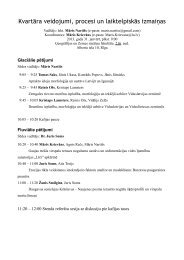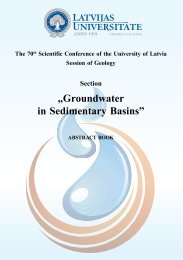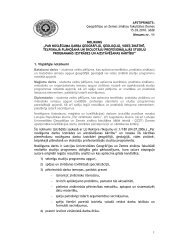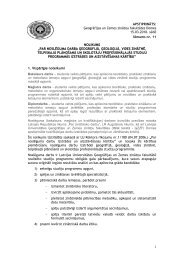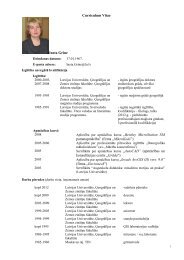VIETU UN REĢIONU ATTĪSTĪBAStarting a newly established commercial enterprise within a self-owned business premisewas still hardly possible in the years 1991 and 1992. One reason for this was the fact thatprivatisation had not yet fully occurred. The second hindering factor was the liquidation ofnational trading ventures which made too few business premises in good condition available.And the third reason was the announcement on the restitution of real estate (see Factor II). Aboom in the establishment of retail trade finally came in the period from 1993 to 1995. Thus thenumber of the retail businesses rose around 50% in Riga between 1992 and 1996. The salesareas in the retail trade increased in the periods mentioned in the Latvia by about 66%, and theaverage sales area per 1,000 inhabitants increased by an appropriate order of magnitude. On theother hand, since these start-ups usually consisted of small companies, the increase of the salesarea per retail outlet was modest in relation to East Germany. No extreme degree of informalityin the retail trade was reached in Latvia in comparison with the development in Poland, Russiaor Albania; therefore, the increase in sales kiosks and ambulatory street traders in the city areaoccurred within a relatively modest framework, except in the big market areas (see below). Thenew laws made it also possible for prospective foreign investors to create new commercialactivities in Latvia.Consequently, the combination of the privatisation process and the newly foundedcompanies in the retail trade together resulted in a mixture of different possession and propertystructures, whereby the portion of the enterprises which were still (at least partly) state propertywas already largely irrelevant by the middle of the 1990s. Internationally operating retail chainsbased abroad (in Western or Central Europe), which in particular suggest the shopping streets inthe cities of Budapest, Prague or Warsaw, are represented in the Latvian capital only to a smallextent and have been implemented only since the end of the 1990s in post-modern passageways.Compared to the outskirts of the Polish, Czech and Hungarian metropolises, where since themiddle of the 1990s huge self-service department stores or shopping centres had already settled,only some not very big units were recently opened in Riga (also see below). Latvia still has acomparatively small sales market. The prospects of fast economic success from internationalinvestments in retail trade were (and are) much smaller than in the countries directly to the eastof Central Europe. Nevertheless, an important internationalisation of trade can be observed inthe city centre, where numerous domestic companies specialise in selling imported brandedarticles as franchisers. The fact that the privatisation was mostly steered endogenously does notmean that no domestic chains, operating locally or even country-wide, could be established.The retail trade in Riga must almost exclusively be managed in rented premises;therefore, the following section will clarify, among other things, who the landlords of the shopsfor re-established or newly founded retail businesses are.Factor II: The transition of the real estate and land marketThe mode of restitution (denationalisation) of land and buildings expropriatedillegitimately and afterwards nationalised during the Soviet era was also of crucial importancefor the structural changes in the retail trade. As Table 2 shows, appropriate laws for theintroduction of restitution procedures were already adopted in Latvia in the year 1991. Theselegislative efforts were profound (as in neighbouring Estonia): not only citizens were entitled tolay claim for the return of the expropriated real estate property but also emigrants (livingabroad), so far as they could prove to have inhabited the country before the indicated deadline(17 June 1940). The purely quantitative result of the restitution legislation was that 3,943residential buildings in Riga were returned to their former owners. The restitution procedureswere surprisingly fast; by the end of 1993 half of all formerly expropriated buildings hadalready been returned to the former owners, and by the end of 1997 almost all the old legal titleswere restored.Which consequences did this rapid restitution of real estates have in particular for theprivatised retail businesses in the Latvian capital? Those formerly state-owned retail tradecompanies whose shops were located in buildings for which a property restitution wassubmitted had to start direct treaty negotiations with the pre-Soviet era former owners (qua newowners), if they wanted to use the business premises further. This put the retailers in a very poorstarting position.80
DEVELOPMENT OF PLACES AND REGIONSTable 2Various Forms of the Treatment of Property Rights Concerning Real Estatein Latvia during the 1990sĪpašuma tiesību formas Latvijā 20. gs. 90. gadosForms of the Treatment of Property RightsRestitution offormerly stateownedlands andtheir legal basisBeneficiaries of therestitution of propertyrightsTenant protection forprivate citizens and/orcommercial users (forexample, retailers) inrestored buildingsHousingprivatisation andtheir legal basesRelative portion oflocal property whichcan be rented and/orleased as businessspace(At the end ofthe1990sYes,comprehen-sivereturn inaccordance withthe law ofdenationalisationofprivate propertyof 30 October1991Entitled not onlycitizens but alsoemigrants (foreignersand theirbeneficiaries) so far asthe deadline (17 June1940) of habitation inLatvia was met, butlegal problems withBaltic Germans (resettlers)because ofthe Germandistribution ofburdensFor commercial tenantsand administrativemechanisms: noprotection againstevictionFor tenants of dwellings:7 years starting from thetime of the restitutionYes,but due to lengthypolitical discussionsdischarged onlycomparatively late;Conversion startingfrom March 1996Use of shares(Certificates)Law concerningprivatisation ofnational dwellingsand the autonomy ofsuch in 21 May 1995Small,(within the OldTown, somewhathigher)Sources: Frydman et. al. (1993); Jaffe, Turner & Victorin (1995); Roggemann, H. (Ed.) (1996); Venesaar & Hachey(Ed.) (1995); Wollmann (1994); as well as the authors’ findingsOwing to the very much liberalised legal regulations, the owners had been put into anextremely favourable position, in which they could quit contracts with commercial tenants.Even public administrations could be more or less evicted without notice from their buildings.Thus the owners received immediate and almost unrestricted control over returned real estate onsuch premises. The amount of the rent and the running time of the new lease could therefore benegotiated under purely free market criteria and without national regulation. The fact that thenew owners exhausted as far as possible the legal framework available concerningcommercially used areas in their buildings, which were again profitable, is quite understandable,particularly because a legally assured lodging right had been granted to the tenants for theduration of seven years. Those who could not follow the demands for renting the outlets wereforced to close and leave. Thus it was very often the case that many stores and service facilities,despite partially effected privatisation, disappeared immediately from the market after therestitution of the real estate property. The old state-run commercial structures were thusliquidated in Riga quickly and comprehensively. Especially in the years 1993 and 1994 thesituation in the central part of Riga, which included parts of the Old Town (Vecrīga), wascharacterised by a very fast change in retail trade. Many outlets in denationalised buildings wereunder reconstruction, waiting for their new purposes. One of the most impressive, though notvery successful examples, concerning the location of retail trade, is the reconstruction of thefamous shopping centre Berga Bazārs, originally built at the beginning of the 20 th century.Those buildings which had been built by the state or by cooperatives after the Sovietoccupation were denationalised during the so-called Mass Privatisation. The same applied tothe few buildings which were put under state control between 1940 and 1990, but no requestswere made for restitution, nor was it granted in those cases in which the desired return could notbe sufficiently justified by the applicant. In the course of this privatisation the tenants wereshifted into a legal situation, under which a portion was paid through public funds (Privatisation81



